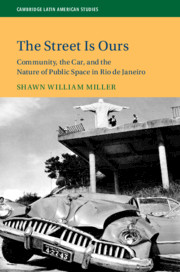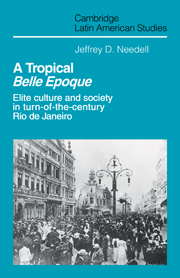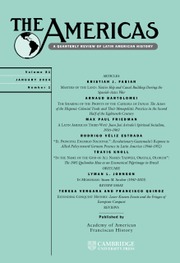The Street Is Ours
Community, the Car, and the Nature of Public Space in Rio de Janeiro
£106.00
Part of Cambridge Latin American Studies
- Author: Shawn William Miller, Brigham Young University, Utah
- Date Published: August 2018
- availability: In stock
- format: Hardback
- isbn: 9781108426978
£
106.00
Hardback
Other available formats:
Paperback, eBook
Looking for an inspection copy?
This title is not currently available on inspection
-
The streets of Rio de Janeiro have long been characterized as exuberant and exotic places for social commerce, political expression, and the production and dissemination of culture. The Street is Ours examines the changing uses and meanings of Rio de Janeiro's streets and argues that the automobile, by literally occupying much of the street's space and by introducing death and injury on a new scale, significantly transformed the public commons. Once viewed as a natural resource and a place of equitable access, deep meaning, and diverse functions, the street has changed into a space of exclusion that prioritizes automotive movement. Taking an environmental approach, Shawn William Miller surveys the costs and failures of this spatial transformation and demonstrates how Rio's citizens have resisted the automobile's intrusions and, in some cases, even reversed the long trend of closing the street against its potential utilities.
Read more- Approaches the street as a contested common space with a diverse past and an open future
- Examines the function of Rio de Janeiro's streets over a broad span of time, showing the evolution of the street from a natural space to a place dominated by automated movement
- Links the history of common spaces with the history of the automobile
Reviews & endorsements
'With touches of the finest conventions of writing about Brazilian cities and their denizens, this is a study of the streets of downtown Rio de Janeiro as experienced by people, animals, and machines. Alongside his history of street paving and street beautification, Miller describes the 'invention' of pedestrian and motorist. Attentive to the entwined histories of danger and thrill in the Marvelous City, The Street is Ours is a fascinating examination of the most commonplace of all urban settings - the street - as a contested, lively public good often turned over to, but never fully dominated by, the private needs of the automobile.' Daryle Williams, co-editor of The Rio de Janeiro Reader: History, Culture, Politics
See more reviews'By analyzing the street as a 'natural resource', one surprisingly resistant to privatization and depletion, this book skillfully blends urban, social, and environmental history. Miller shows the various ways Cariocas have used their streets and how this resource has been transformed by the physical presence and violent motion of the automobile. Richly detailed and elegantly provocative, Miller invites us to experience the city of the past with all our senses.' Emily Wakild, author of Revolutionary Parks: Conservation, Social Justice, and Mexico's National Parks, 1910–1940
'The Street Is Ours: Community, the Car, and the Nature of Public Space in Rio de Janeiro is a brilliant history of the streets of Rio de Janeiro … a rich and captivating volume. Miller's depiction of Rio's transforming streets is dense, lively, and diverse, thanks to a great range of sources that includes legal documents, gossip columns, literature, music and arts, automobile press, official statistics, and not least the urban landscape itself.' Antoine Acker, The American Historical Review
'The Street Is Ours is a unique urban environmental history that makes one see that cities, not just the countryside, were once more than they are today. Community requires space; modernity, via the car, stripped that away. The book helps explain parts of Rio culture today, like the closure of certain highways on weekends in an effort to recapture the street's multidimensionality. Miller successfully creates a tangible history of something that one might otherwise only feel.' Jennifer Eaglin, Hispanic American Historical Review
Customer reviews
Not yet reviewed
Be the first to review
Review was not posted due to profanity
×Product details
- Date Published: August 2018
- format: Hardback
- isbn: 9781108426978
- length: 362 pages
- dimensions: 235 x 157 x 24 mm
- weight: 0.66kg
- contains: 15 b/w illus. 2 maps
- availability: In stock
Table of Contents
Introduction: a common space to enjoy – Paquetá Island
1. Systems circulatory before the wheel – Ouvidor Street
2. The street's apotheosis – Central Avenue
3. Putting the car in carnival – Rio Branco Avenue
4. A blunt instrument – Misericórdia Square
5. Automotive law and the promises of safety – Assembly Street
6. Buyers and regrets – Praça Onze (Square Eleven)
7. Automotive flow vs. automotive storage – Castelo Hill
Conclusion: revolutions at the end of the street – Brasilia.
Sorry, this resource is locked
Please register or sign in to request access. If you are having problems accessing these resources please email lecturers@cambridge.org
Register Sign in» Proceed
You are now leaving the Cambridge University Press website. Your eBook purchase and download will be completed by our partner www.ebooks.com. Please see the permission section of the www.ebooks.com catalogue page for details of the print & copy limits on our eBooks.
Continue ×Are you sure you want to delete your account?
This cannot be undone.
Thank you for your feedback which will help us improve our service.
If you requested a response, we will make sure to get back to you shortly.
×





